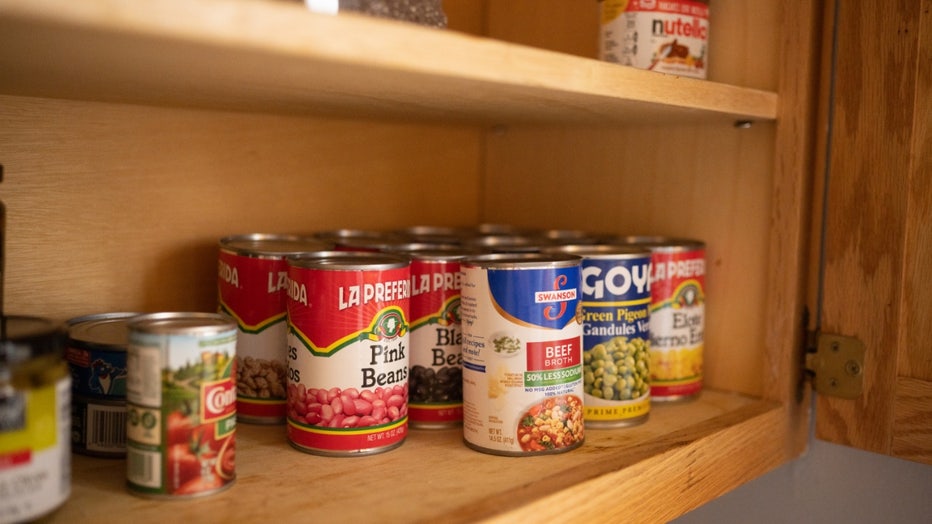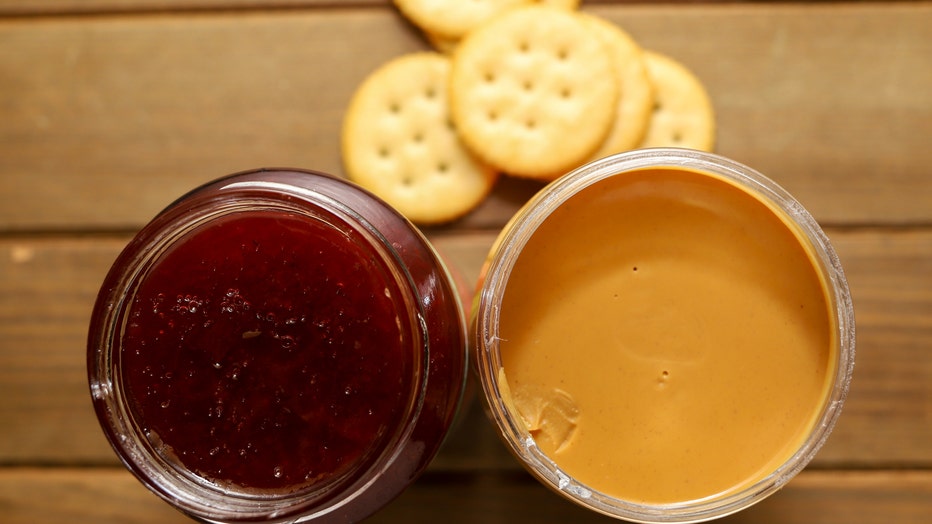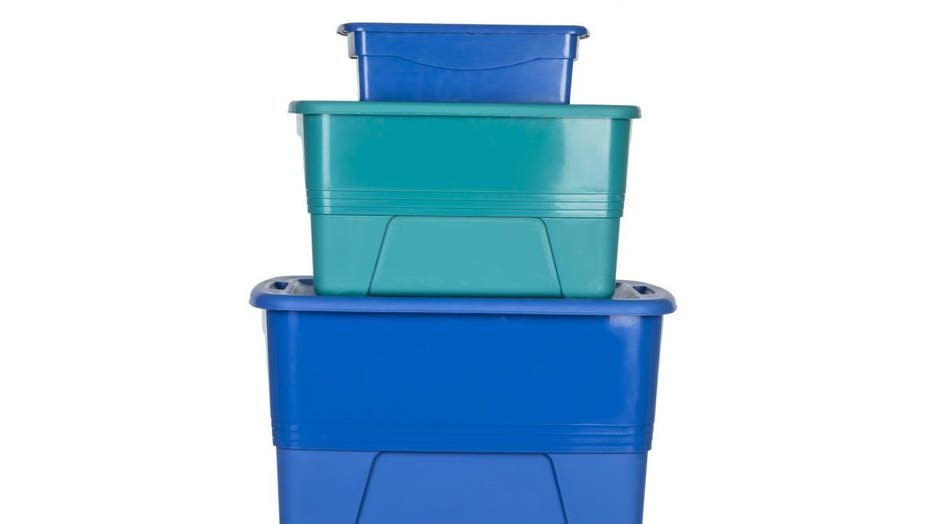Hurricane preparedness: What pantry essentials to buy – and what to leave behind
This content was created in partnership with our sponsor, Publix. The FOX editorial team was not involved in the creation of this content.
Relieve some of the stress of emergency situations with a little sensible prep. (Image: Kwangmoozaa, iStock / Getty Images Plus) (Getty Images)
The only thing predictable about emergencies is that sooner or later, you’ll have one. Luckily, there are ways to prepare for hurricanes. We’ve partnered with Publix to create this storm prep grocery list – a tool useful for making sure hurricane food shopping is as painless an experience as possible, for your mind, your schedule and your wallet.
We’ve broken this hurricane grocery list into several sections. Below you’ll find our suggestions for non-perishable foods, produce (yes, produce!), emergency supplies, pantry staples and more. And we’ve also included a list of some potentially tempting items you may want to skip.
Take our suggestions, make them your own, and you’ll be ready to hunker down for a few days or get out of town in a hurry. Either way, you’ll have snacks, batteries and (hopefully) some peace of mind to spare.
And make sure to check out our list of Go-Bag essentials, along with tips on how to keep it up to date.
Hurricane grocery list: How much to buy
FEMA recommends that your emergency food supplies should be enough for two weeks if you’re at home, and three days for evacuation. But before visions of mile-long receipts start dancing around in your mind, remember that you likely already have supplies in your pantry that are perfect for this purpose. More on that below.
As for how many of each item on this list to buy, it’s best to keep things simple: Consider realistic serving size, then multiply by the number of members of your household. The label on a small can of chicken noodle soup might say it includes 2.5 servings per can, but would those portion sizes make for a filling meal? Maybe, maybe not. Go with what you know, not what a label says is reasonable.
Remember, the goal is not to purchase two weeks worth of meals – it’s to make sure that between the food you have on hand and the food you purchase in the days before an extreme weather event, you’re able to remove "how will I feed my family" from your list of worries. If 3-4 days worth of food accomplishes that for you, that’s A-OK.
Hurricane prep: First, shop your pantry

Take stock of items you already have on hand. (Image: Boogich, iStock / Getty Images Plus) (Getty Images)
Canned goods, dried fruits, nuts, boxed pasta, canned or dried beans and lentils, powdered milk: these, and other such staples, are things you probably already have on hand. That’s a great place to start. Before you head out on your shopping expedition, check on your current stock of such items – and make sure to check the expiration dates.
Once you’ve done that, gather all those items together, do some serving-size math and decide how many of those items will need to be supplemented. If you’re all set on pasta, great! Consider it crossed off your list. If you’ve got one lonely can of tuna fish, you may want to grab a few more.
Then set everything aside until after your shopping trip, so you can store everything safely and securely together.
Hurricane food shopping list: What to buy
Ingredients and pantry staples
- Powdered milk – a convenient source of protein, vitamin D and calcium
- Dry pasta
- White rice
- Dried beans and lentils
- Bouillon
- Salt and pepper – set of disposable grinders for this purpose only
- Hot sauce (plastic bottle)
- Oil (olive, vegetable, etc.; plastic bottle)
- Peanut butter
- Jelly
Dry goods
- Boxed potatoes
- Ramen noodles
- Oats or instant oatmeal
- Breakfast cereal
- Pudding mix
Canned goods
- Pasta sauce (avoid glass jars if possible)
- Soups, stews and chili
- Fruits
- Pasta dishes
- Veggies and beans
- Meats
- Fish (tuna, anchovies, sardines, etc.)
Snacks and comfort foods
- Nuts
- Crackers
- Jerky
- Granola bars and energy bars
- Dried fruits and vegetables
- Applesauce
- Shelf-stable pudding
- Graham crackers, animal crackers, cookies
- Hard candy, licorice, gummy bears
- Jiffy-Pop

Crackers are an excellent peanut butter delivery mechanism (Image: Robin Gentry, iStock / Getty Images Plus) (Getty Images)
Beverages
- Water (a gallon, per person, per day – consider both bottled water and a few multi-gallon tabletop containers, preferably with a spout)
- Instant coffee
- Canned juice (100% fruit juice)
- Tea bags
- Cocoa mix
Perishables
- Apples
- Bananas
- Bread (put in the freezer and leave it there until you’re ready to eat; consider dividing into two freezer bags)
- Potatoes and onions (if you plan on cooking)
Pet supplies
- Canned or dry food
- Treats
- Medication delivery (peanut butter, pill pockets, etc.)
Baby supplies
- Formula
- Baby food
- Diapers
- Wipes
- Skin care (rash ointment, baby oil, lotion, etc.)
Dietary restrictions, health conditions, etc.
Keep in mind any specific needs of those in your household – seniors, diabetics, those with heart health concerns, allergies, lactose intolerance, dietary restrictions, religious dietary practices, vegans, vegetarians, etc.
- Low-sodium canned goods
- Shelf-stable almond or oat milk
- Vegetarian, vegan and/or dairy-free soups and stews
- Caffeinated water (for migraines)
- Nutrition drinks (Ensure)
- Kosher or halal products
- Protein powder
Hurricane food shopping list: What to skip
Frozen food
This should go without saying, but you’re going to want to avoid opening your freezer unless absolutely necessary. When it comes to something like bread – convenient, hearty, shareable, no cooking required – it’s worth devoting some freezer space and opening up that freezer door in a hurry to yank it out. But in almost every other circumstance, you’ll want to opt for a canned version instead. (Ice cream, alas, is a no-go.)
Bread, maybe
Yes, bread is on the list of things to buy, too. But unless you have the space to freeze a loaf of bread or are sure you’ll be eating it in the next 1-2 days, you’ll want to save the space and budget for a food less likely to spoil before you can eat it. Crackers are a perfectly good peanut butter delivery mechanism!
Most produce
Apples and bananas are big heroes in situations like these, as are potatoes and onions if you’ve got a knack for cooking outdoors and the tools to do it safely. But all those healthy berries, leafy greens, heads of broccoli, cherry tomatoes, stalks of celery – you’ll want to leave those where they are. In many cases, produce you buy at the store needs to be refrigerated. There are also some foods that, while just fine without a fridge, are delicate enough that they’re not practical in an extreme situation. (Looking at you, peaches and tomatoes.)
Chocolate (the melty kind)
There’s nothing that says you can’t have any chocolate. But when it comes to comfort food, it’s better to opt for cookies and candies that won’t make a mess, especially if there’s a chance water will be at a premium. Think gummy bears, lollipops and animal crackers, not M&Ms and Reece’s.
Cheese, pickles and other delicious things that belong in the fridge
When you open your fridge in this type of emergency, it should be to pull out things you already have that will eventually go bad, and each time shortens the window you have in which those foods will remain edible. Best not to add to the mix.
RELATED: Go-Bag 101: How to make one – and keep it up to date
Hurricane grocery list: How to store

Consider investing in a few sturdy plastic tubs with clip-on lids to keep your stores cool and dry. (iStock / Getty Images) (Getty Images)
Store in a cool, dry place
- Consider investing in a couple big plastic storage tubs with lids. On the off chance that you’ll wind up exposed to the elements in any way, it’s best to make sure the food is secured against animals, so look for lids that latch shut or keep a couple of bungee cords at hand.
- Think intuitively about how things are grouped together – keep peanut butter with crackers, pasta with pasta sauce and so on. It’s also worth separating the foods that need preparation of some kind from those you can eat as-is, to keep things from getting too disorganized.
- For foods in cardboard boxes (pasta, for example), transfer to freezer bags and seal securely
First in, first out
- As you’re packing things up, put the closest expiration dates near the front. When you replenish your stores, add new items to the back.
- Once you begin eating, start with the food in the fridge. Open it as little as possible.
- If you’re likely to regain power soon, keep the freezer closed. Otherwise, start on frozen foods you can safely eat after eating the food in the fridge.
Hurricane prep: Other must-haves
Paper and plastic products
- Garbage bags
- Paper towels
- Toilet paper
- Cleansing wipes/moist towelettes
- Paper plates and cups
- Disposable utensils
Household supplies
- Manual can opener
- Matches (strike anywhere)
- Batteries (multiple sizes)
- Dish soap
- Aluminum foil
- Stick lighter
- Scissors
Emergency supplies
- Flashlights
- Duct tape
- Candles
- Radio (hand-crank or battery-powered)
- Multi-purpose tool
- First aid kit and latex gloves
- Hand sanitizer
- Disposable rain ponchos
- Alcohol wipes
- Hearing aids and batteries
- Safety pins
- Local map
- Rope
- Plastic tarps
- Small toolbox (including wrench and pliers)
- Safety goggles or glasses
- Emergency blankets
- Liquid bleach
- Work gloves
- Whistle
- N95 or KN95 masks
- Hatchet or ax
- Fire extinguisher
Storage
- Freezer bags, multiple sizes
- Food storage containers
- Large plastic tubs with handles
Personal care
- Bars of soap (unscented)
- Travel-size toiletries
- Spare toothbrushes and toothpaste
- Pain reliever – ibuprofen, acetaminophen and aspirin
- Medications and medical products (7-day supply – don’t forget testing supplies for blood sugar/pressure/etc.)
- Sunscreen (SPF 30 or higher)
- Bug repellent
- Folding fans
- Menstrual products
- Contact lenses and solution
- Sunglasses
Cooking and dining supplies
Remember: Always cook outside.
- Ready-to-light charcoal (if you have a grill)
- Camp stove, fondue pot or chafing dish
- Sterno or propane

Remember to include furry friends in your hurricane preparedness plan. (Getty Images)
Pets
- Poop bags
- Cat litter
- Potty pads
- Leash, collar, harness
- Cat carrier
- Medications
- Food and water bowls
- Anxiety relief tools (Thunder Shirt, heartbeat toys, supplements, etc.)
Assorted
- Cash
- Copies of essential papers (birth certificates, insurance documents, deeds/leases, passports, emergency contact info, etc.) in freezer bag
- Pencil or pen and paper
- Citronella candle
- Portable power banks (for cell phones) and cables
- Extra set of keys to residence and car
- Coloring books and crayons
- Playing cards
This content was created in partnership with our sponsor, Publix. The FOX editorial team was not involved in the creation of this content.

